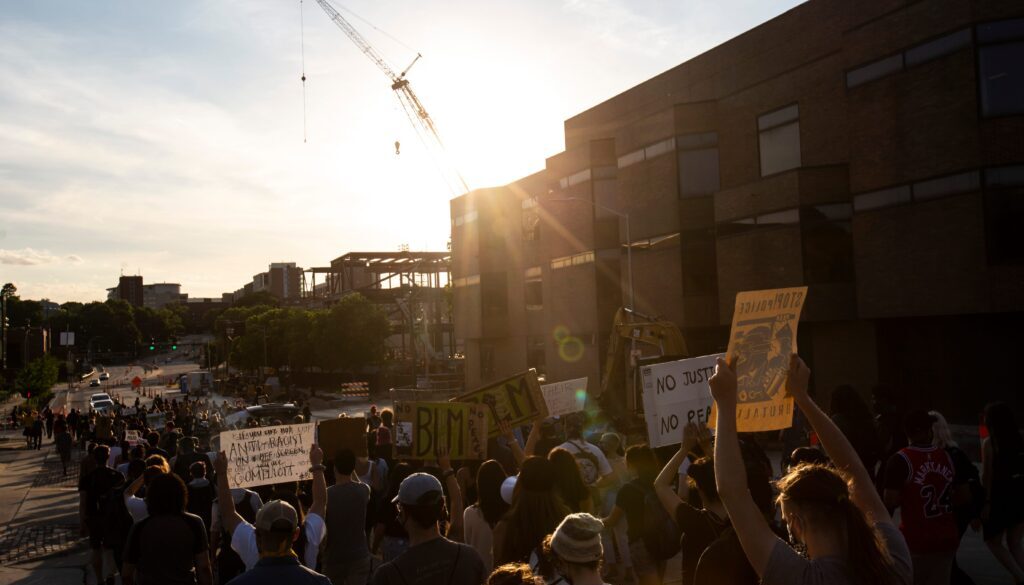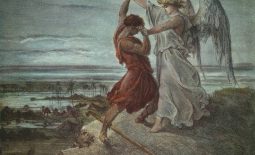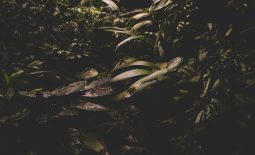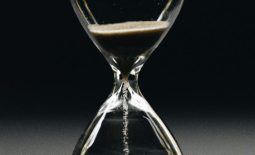Tired
“We are tired and we are hurting.”
This heartrending statement is one I heard over and over again from our siblings of color; in the media, on the internet and in real life, as I find myself listening and reading and sitting with the force of this reality today. Black and brown people are tired and hurting and wrapped into those two simple words are universes of pain and experiences, far too complex to do justice here. Exhaustion and agony are shorthand for four hundred years of trauma that I can never pretend to understand.
“We are tired and we are hurting.”
Last Shabbat, I attended two rallies: a ‘Speak Up and Speak Out’ rally in Pheasant Ridge, and a rally at Old Capitol. I committed to bearing witness, listening and recording—I am still transcribing the Black and brown voices that I recorded on my iPhone, aiming to let their words resound in a future sermon.
I testify to that hurt and weariness; conditions that seem to be defining our current moment. The Black Lives Matter movement, the call for racial justice, the economic crisis, mass unemployment, the pandemic—there are so many points and counter-points of pain, and we are called to bear witness to it. This is the second week that I have struggled with finding the words for a sermon; to know how to speak truth to power, how to bring virtue and compassion, humility and reflection, bravery and encounter to this moment. To face my own inadequacies, socializations and biases with unwavering honesty and to just be, well, present, as I listen to my clergy partners of color, to my congregants of color, to my rabbinic colleagues of color, to my fellow human beings. Stories are so much more powerful than proclamations; lived experiences so much more authentic than pious professions. Few texts teach us this lesson more deeply than our own Torah.
The book of Numbers visits and revisits stories as a way to work through trauma. When we think of ‘journeys of transformation’, we often idealize the outcome through the lens of survivorship bias. I believe that this is a truly American genre; the ‘from rags to riches’ story, the tale of perseverance against all odds. However, each of these outcomes came at immeasurable costs. For every arc of history that bends towards justice, the curvature breaks bones and twists spines. Redemption cannot erase bondage, success cannot absolve trauma. The book of Numbers knows this and allows us to revisit trauma; to listen to it, to read about it and to sit with it, in our own discomfited wilderness, raw and jarring and painful and oh so necessary. For trauma can fracture into a thousand bone splinters as this week’s Torah portion demonstrates: the Israelites left Sinai, and Moses’ trusted advisor, ‘Hobab’ or Yitro, chooses to return to his own land of Midian. During this second year of the wilderness sojourning, trauma, fear and loneliness start to take their toll. The Israelites complain; they crave meat, they sit at the entrances of their tents and weep bitterly. The portion culminates in the strange episode where Miriam, Moses and Aaron face an unprecedented fraternal conflict when Miriam and Aaron criticize Moses ‘al odot ha’isha ha’Kushit asher lakach ki ishah Kushit lakach.’ – ‘because of the Cushite woman he had married: “He married a Cushite woman!” (Num. 12:1)
The tradition really struggles with what this cryptic conflict describes. Does it fault Moses for marrying a mystery additional wife while neglecting Tzipporah? Or are Tzipporah the Midianite and the Cushite woman one-and-the-same? Some rabbinic interpretations rush to the Cushite woman’s defense since Moses had neglected his conjugal duties since his direct communications with the Eternal. Others paint Miriam as transgressing through ‘l’shon ha’ra’, slander, and seek to put her bid for prophetic power and authority back in its predictably patriarchal place. More contemporary interpretations have examined the ethnicity of ‘the Cushite woman’ and wondered whether this is an early, Biblical account of racism, or at minimum, implicit bias.
Last year, when reflecting on this portion with a rabbinic colleague of color who I respect a great deal, he put that theory to bed—with an interesting twist. Rabbi Shais Rishon grew up in an African-American Orthodox Jewish family and has continued this life of observance, learning and leadership himself: through his rabbinic work and racial justice work, as well as through his teaching and writing. I asked him about ‘the Cushite woman’ and hoping to do justice to his nuanced position, I recall him sharing that to see this as an episode of racial prejudice was itself an expression of Jewish ‘whiteness’. While it is true that Moses’ wife is defined by her ethnicity, we also know that the Cushites (analogous to contemporary Ethiopians) are referenced in Scripture frequently and never in any kind of racist understanding. (The Bible is keen to distinguish different ethnic groups and adamant about balancing a particularist agenda with a universalist vision, but the Bible is completely disinterested in applying the racist filters that we as a culture use). Furthermore, Rabbi Rishon argued that our reading as this text is so flawed because of a crucial ethnocentric misreading of ancient Israel: we assume that Moses, Miriam and Aaron did not share the skin tone of the Cushite wife. We assume that the Israelites were lighter-skinned, or perhaps even white, and Rabbi Rishon was quick to disabuse me of this notion. Historically, archeologically and textually (including midrashically), he argued, it is very likely that our Israelite forebears were people of color and it is us who should relearn to read Scripture through this frame. Our interchange was friendly and respectful, Rabbi Rishon the picture of grace and good humor as he educated me. And at the same time, he was weary of doing so.
Last week, I shot him a message through Facebook Messenger, wanting to check in on him and express my solidarity. I asked him how he was doing. His first response was that he was so very tired.
We are tired and we are hurting.
The journeys of the wilderness are exactly that: wilderness. They are long, arduous and difficult, as we brush the sand from our faces and taste the dust in our mouths. It is clear that we are in the wilderness, my brothers and sisters, my siblings. In this place of our desolation, it is so hard to find the words. Even Moses, when praying for his stricken sister, could muster no more than ‘El na refa na lah’, ‘please God, heal her now.’ We, too, yearn to desperately pray for the healing of this land, as we are stricken by this chronic, corrupting disease of racism. But like Miriam, we cannot be immediately healed. While healing would be comfortable and hope-giving, this is not what we are called to do at this time. We are called to sit, and listen, and learn. And seize the opportunity to gaze upon ourselves through a new frame. And to hold space and pain, to gently cradle trauma in our hands and to honor the difficulty of this moment, precisely where we are now.
If we can do that, then healing may come. Right now, we must walk, pitch our tent, encamp in the gritty reality that is and offer rest and repose for the weary. This is our sacred task.




